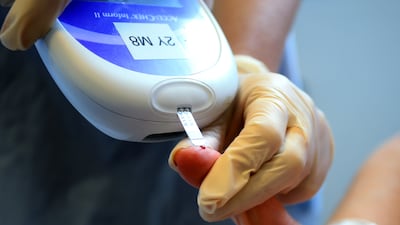Covid-19 infection appears to be linked to an increased risk of type 2 diabetes, a study suggests.
Researchers from Germany have associated the two ailments in a new paper which explores people’s risk of being diagnosed with type 2 diabetes after they have had Covid-19.
The study, published in the journal Diabetologia, examined data from more than 1,000 GP surgeries in Germany caring for a population of almost nine million patients.
Between March 2020 and January 2021, 35,865 of those patients were diagnosed with Covid-19.
Compared with people who had other upper respiratory tract infections, those who had Covid-19 had a 28 per cent increased risk of being diagnosed with type 2 diabetes.
The authors said that if the results are confirmed, people who have Covid-19 should monitor their blood sugar levels after they recover.
They said that future studies should examine whether pre-existing diabetes “becomes apparent” after a Covid-19 infection due to the stress the disease puts on the body.
Studies should also examine whether “post-Covid diabetes may be reversed after full recovery”.
Lead author Wolfgang Rathmann of the German Diabetes Centre at Heinrich Heine University in Dusseldorf said: “Since the Covid-19 patients were only followed for about three months, further follow-up is needed to understand whether type 2 diabetes after mild Covid-19 is just temporary and can be reversed after they have fully recovered, or whether it leads to a chronic condition.”
“The risk of abnormally high blood sugar in individuals with Covid-19 is most likely a continuum, depending on risk factors such as injury to beta cells, an exaggerated inflammatory response and changes in pandemic-related weight gain and decreased physical activity,” said co-author Oliver Kuss.
“This study, and others, hint that coronavirus could be triggering type 2 diabetes,” said Faye Riley, research communications manager at Diabetes UK.
“But there’s still work to do to unpick the link between the two conditions.
“It’s not yet clear if the virus is causing new cases of type 2 diabetes, bringing undiagnosed cases of type 2 diabetes to light, or temporarily driving up blood sugar levels.
“Everyone, regardless of whether they’ve had coronavirus or not, should be aware of the signs and symptoms of diabetes, these include: unexplained weight loss; feeling thirsty or tired; and going to the toilet more often.
“Some diabetes symptoms, like tiredness, may appear similar to those brought on by coronavirus, and it could be easy to mistake one for the other.
“If you notice any symptoms of diabetes, seek help from your GP practice immediately.”






